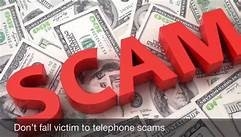DON’T FALL Victim to PHONE CALLS
.jpg)

Residents * Businesses *Agencies
Recently,
several Big Bear Valley residents, businesses and agencies have fallen prey to
cybercrimes.
In
some cases, cyber thieves have hacked into email accounts and mirrored invoices
to make them look legitimate but changing pertinent bank information to
redirect funds to the account of the perpetrator(s).
In
other instances, fake lottery winning notifications are being used to
entice the victim to provide personal information or money up front as
"pre-payment of taxes."
Don't be fooled by these scams! We should all be cautious of anyone asking
for sensitive and personal information to gain access to our individual or
business accounts and/or life savings or retirement accounts.
Genuine
government agencies, state lotteries and other financial institutions do not
ask for personal information such as tax identification numbers or Social
Security numbers on email or telephone communications.
If you ever have
questions about the legitimacy of someone trying to gain access to your
personal information, don’t hesitate to contact the Big Bear Sheriff
Station or the actual institution requesting the information.
ALWAYS BE AWARE OF SCAMS!
Below
is useful information to help keep you from becoming a target:
Businessdictionary.com
defines a
“Scam” as: A fraudulent scheme performed by a dishonest individual, group or
company in an attempt to obtain money or something else of value.
A
“Scam” can also be used to steal your identity and other information about you
and your family.
Remember
that scammers:
·
Will try and gain your
trust by claiming to be from a well-known business or impersonate someone you
know
·
Direct
you to websites they have created or to call numbers they have provided to get
you to give them your personal information
·
They
will often appeal to your emotions
Ten Most Common Scams:
1. Advance
Fee Fraud – A scammer requests fees upfront or personal information in return
for goods, services, money or rewards that they never supply.
2. Lottery,
Sweepstakes and Competition Scams – An email, letter or text message from an
overseas lottery or sweepstakes company arrives out of nowhere.
3. Dating
and Romance Scams – Scammers create fake profiles on legitimate dating
websites. They use these profiles to try to enter into a relationship with
you so they can get ahold of your money and personal details.
4. Computer
Hacking – Phishing emails are commonly used by scammers to trick you into
giving them access to your computer. They ‘fish’ for your personal details
by encouraging you to clink on a link or attachment.
5. Online
Shopping, Classified and Auction Scams – Scammers like shopping online for
victims. Not getting what you paid for is a common scam targeting online
shoppers.
6. Banking,
Credit Card and Online Account Scams – Scammers send email or text messages
that appear to be from your bank, a financial institution or an online
payment service.
7. Small
Business Scams – If you own a small business you can be targeted by scams such
as the issuing of fake bills for unwanted or unauthorized listings,
advertisements, products or services.
8. Job
and Employment Scams – These scams involve offers to work from home or setup
and invest in a business opportunity. Scammers promise a job, high salary
or large investment return following initial upfront payments.
9. Golden
Opportunity and Gambling Scams – Scams often begin with an unexpected phone call
or email from a scammer offering a not-to-be-missed high return or guaranteed
investment in shares, real estate, options or foreign currency trading.
10. Charity
and Medical Scams – Scammers are unscrupulous and take advantage of people who
want to donate to a good cause or find an answer to a health problem.
Charity scams involve scammers collecting money by pretending to work for a
legitimate cause or charity or a fictitious one they have created. Often
scammers will exploit a recent natural disaster or crisis that has been in the
news.
>> For
more information regarding privacy, identity and online security, and to
register for the National Do Not Call Registry visit
the Federal Trade Commission at: https://www.consumer.ftc.gov/articles/0108-national-do-not-call-registry


San Bernadino County SBC Big Bear Sheriff
Sheriff John McMahon Captain Mitch Dittilo